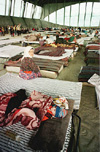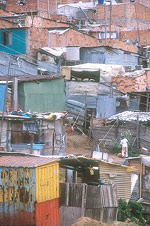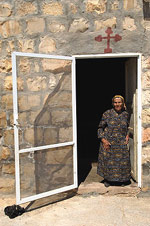International affairs, peace
and human security

|
|

|
|

|
|

|
|

|
|

|
|

|
|
 |
|
 |
WCC UNITED NATIONS ADVOCACY WEEK WORKING SESSIONS In addition to four areas of special focus, a number of working sessions during this year's Advocacy Week will look at :
Southeast Europe Schedule: 9:30 am Tuesday, 16 November, 2004 |
|
Colombia
Colombia has been living in war for more than forty years. In the last decade, this has also meant thousands of deaths every year among the civilian population. Besides the confrontation between the military and the guerrila groups, the paramilitary and drug trafficking have made the sitaution more complex.
The session will try to identify new trends in the conflict, including recent proposals like the “Alternatividad penal” law to disarm the paramilitary, the impact of the Plan Colombia and the Andean Regional Initiative, strongly supported by the United States, as well as the work of the churches and ecumenical organizations in different areas. Particular emphasis will be given to advocacy work targetting the European Union and the United States.
Schedule: 9:30 am Tuesday, November 16, 2004
Read more on the Working Session on Colombia
Israel-Palestine
The WCC has been deeply involved in efforts for peace in the Holy Land since 1948 when the state of Israel was created and the WCC formally established. The conflict situation continues today, and the ecumenical movement has responded by implementing the Ecumenical Accompaniment Programme in Palestine and Israel (EAPPI). At this session, witness from ecumenical accompaniers will be shared and discussed.
Schedule: 5-7 pm Tuesday, 16 November, 2004
SEE:
Israel-Palestine pages
EAPPI
Eminent persons’ response to conflicts in Africa
The eminent persons programme is a proactive effort to prevent the escalation of violence and conflict in Africa by developing sustainable mechanisms and intervention action. In 2002, the All Africa Council of Churches (AACC) and Church World Service (CWS) organized a meeting with the African national Christian councils and fellowships and presented the need for organizing an eminent persons programme. This proposal was discussed at a recent meeting in Geneva between AACC, CWS and WCC.
Proposed tasks of eminent persons:
- To play the crucial role in a process of negotiation and peaceful resolution of conflicts.
- To ensure adequate pressure for parties in conflict are put in place for any amicable agreements to be reached.
- To work with the Churches and local ecumenical instruments to sustain the secured peace.
At this working session, information will be shared about this new upcoming programme as it is an action on behalf of the broader ecumenical family.
Schedule: 9:30 – 10:30 am Wednesday, 17 November, 2004
Advocacy in conflicts and crisis
The World Council of Churches’ Commission on international Affairs (WCC/CCIA) has a long history of involvement in advocacy work both at national and international levels. To do this work, CCIA has adopted different strategies depending on the requirements of a particular situation. In the current context, like everything else in the ecumenical movement, the role of advocacy is also undergoing change. Presently there are number of actors engaged in global advocacy for policy change.
In this working session, we are looking at the significance of advocacy in the changing world situation, among others the role of ecumenical organizations; advocacy through coalitions and alliances; different models of advocacy (campaign model, visits of delegations, providing information, analysis; identifying key individuals and institutions, confidential representations made to some governments on critical or key concerns of churches and representation to inter-governmental bodies on specific cases).
WCC International Affairs staff will look through these and some specific examples of the CCIA work like the issue of unification of the Korean Peninsula and its people, the effectiveness and learnings of those examples. We will alse be gathering of information on agencies' engagement in conflict resolution and emergency advocacy, and looking through the issues the agencies are currently involved in.
Schedule: 3:30 – 5 pm Wednesday, 17 November, 2004
International Criminal Court
One of the most important steps made in international law in the last years has been the establishment of the International Criminal Court (ICC), which entered into force in July 2002 as an instrument to address impunity and serious human rights violations. The ICC, according to its article 5, has the following crimes under its jurisdiction: genocide, crimes against humanity, war crimes and the crime of aggression.
Churches in different parts of the world and the World Council of Churches (WCC) had been advocating for the ICC for some time. WCC is particularly involved in the work of the Faith and ethics Caucus for the ICC, part of an NGo coalition for the ICC, and the Centre for Justice & Reconciliation based in The Hague.
This session will present the present work of the ICC, the participation of victims in ICC's procedures, and faith-based organizations' involvement in advocacy for the ICC.
Schedule: 9:30-10:30 am Thursday, 18 November, 2004
SEE ALSO:
WCC - Impunity, Truth, Justice & Reconciliation - International Criminal Court
Iraq
The crisis in Iraq continues to challenge churches on many fronts:
- Insecurity and violence are taking a heavy toll on the people of Iraq, especially in the central part of the country
- Outside efforts to assist Iraqis are severely constrained
- The wellbeing of the most vulnerable sectors of the population remains a low priority nationally and internationally
- International law and international humanitarian law are breached
- Some of Iraq's churches and Christians have been especially targeted
- Certain Western church groups are present under these circumstances with evangelistic agendas.
Concerned churches said and did much about the Iraq crisis during the build-up to war, but rather less has been undertaken since that time. Complications and limitations abound. What guidance is needed now?
The session will review the current situation in Iraq and seek to identify critical and feasible actions by churches and related organizations for the period ahead. One outcome will be that participants will be asked to offer input in writing for use in developing an upcoming WCC statement on the Iraq crisis.
Schedule: 11 am – 12 pm, Thursday, 18 November, 2004
SEE ALSO :
"The church stance on Iraq: what now?" - detailed programme for this working session.
International Affairs - Regional concerns - Iraq



